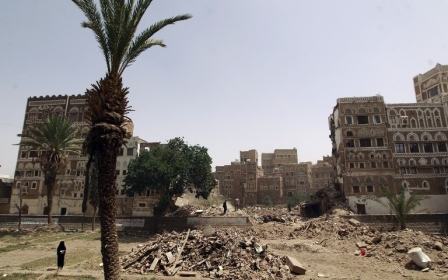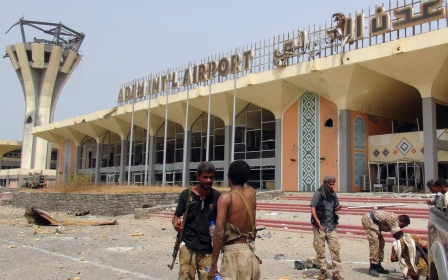Saudi-led coalition mistakenly strikes pro-government forces after truce

Saudi-led coalition warplanes on Monday hit positions of pro-government forces in south Yemen by mistake, killing 12 people on the first day of a humanitarian truce, Yemeni military sources said.
The raids targeted positions in Lahj province following Houthi attacks in the southern area where fighting between the Saudi-supported loyalists and the group have recently intensified, the sources said.
The strikes come a day after the coalition said it was suspending its air war on Monday for five days to allow desperately needed aid deliveries. The coalition said it reserved the right to respond to "military activity or movement".
The Houthis, who control swathes of Yemen including the capital Sanaa after sweeping from their northern stronghold late last year, said they had not been consulted about the unilateral coalition ceasefire that began at midnight (Sunday 2100 GMT).
In addition to those in Lahj, Houthi attacks were also reported in Taiz and Dhaleh, witnesses and military sources told AFP.
Houthi tanks fired on residential areas in Jebel Sabr in Taiz, witnesses said, sparking clashes with loyalist troops, witnesses said. Military sources said 11 Houthis, five civilians and four loyalists were killed.
In Marib to the east of Sanaa, the group launched an offensive against loyalist positions, residents said.
Clashes also erupted outside the southern port city of Aden, where pro-government fighters last week expelled the Houthis after four months of ferocious fighting.
The loyalists seized Mujassam, an area on the northern outskirts of the city, as well as several farms near Bir Ahmed district, military source said.
Three rockets allegedly fired by the Houthis struck on Monday afternoon near Aden airport which reopened last week for aid delivery after being recaptured by loyalists, other military sources said.
The loyalist forces have been bolstered by new weaponry and armoured vehicles delivered by the coalition.
Troops trained and armed by the coalition appeared to have triggered the shift in favour of the pro-Hadi forces.
Truce 'not long enough'
UN chief Ban Ki-moon earlier made a plea for all sides to "agree to and maintain the humanitarian pause for the sake of all the Yemeni people".
But Mohammed Ali al-Houthi, the self-described "president of the High Committee of the Revolution", a body formed by Houthi militants, said his group had not been consulted by the UN about the ceasefire.
The group could therefore not give a "negative or positive" answer about the truce, he said.
The Red Cross called on all parties to respect the ceasefire, and urged a longer truce.
"We would like to see a longer and stable truce, which is respected from all sides to allow humanitarian agencies to reach all affected areas," said the Red Cross spokesman in Sanaa, Adnan Hizam.
"Five days are not enough to cover the humanitarian needs," he told AFP.
The UN says the conflict has killed more than 3,640 people, around half of them civilians, since late March.
A UN-declared, six-day truce failed to take hold earlier this month after it was ignored by both the coalition and the Houthis.
Relief supplies, however, have begun to trickle into Aden after loyalist fighters secured the city, which had been Hadi's last refuge before he fled to Saudi Arabia in March.
Several ships have docked in Aden since last Tuesday carrying thousands of tonnes of aid supplies sent by the UN World Food Programme and Gulf nations.
But distributing the aid, particularly outside the city, poses a major challenge.
New MEE newsletter: Jerusalem Dispatch
Sign up to get the latest insights and analysis on Israel-Palestine, alongside Turkey Unpacked and other MEE newsletters
Middle East Eye delivers independent and unrivalled coverage and analysis of the Middle East, North Africa and beyond. To learn more about republishing this content and the associated fees, please fill out this form. More about MEE can be found here.



